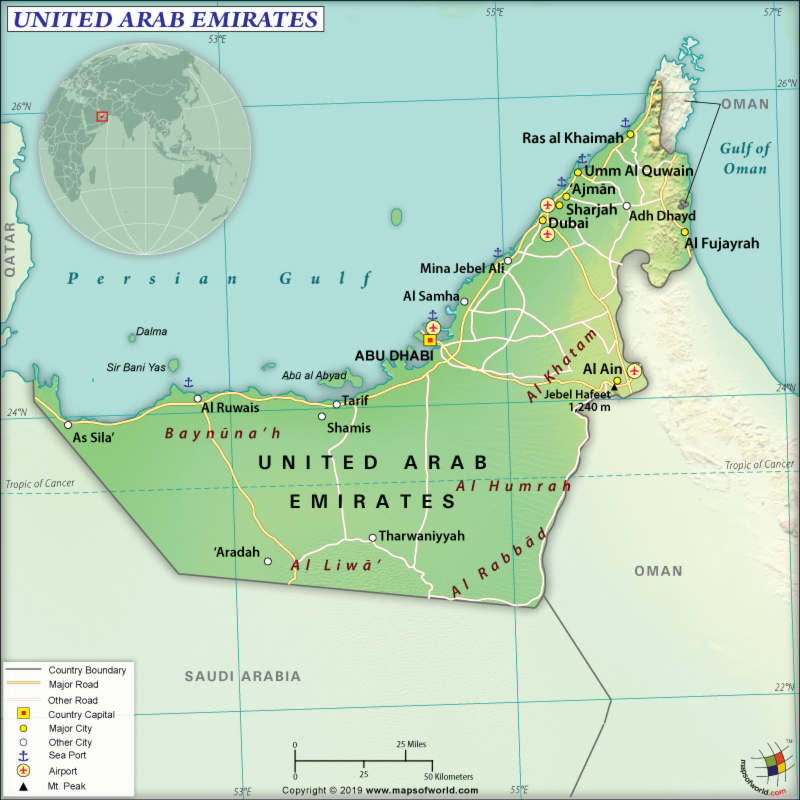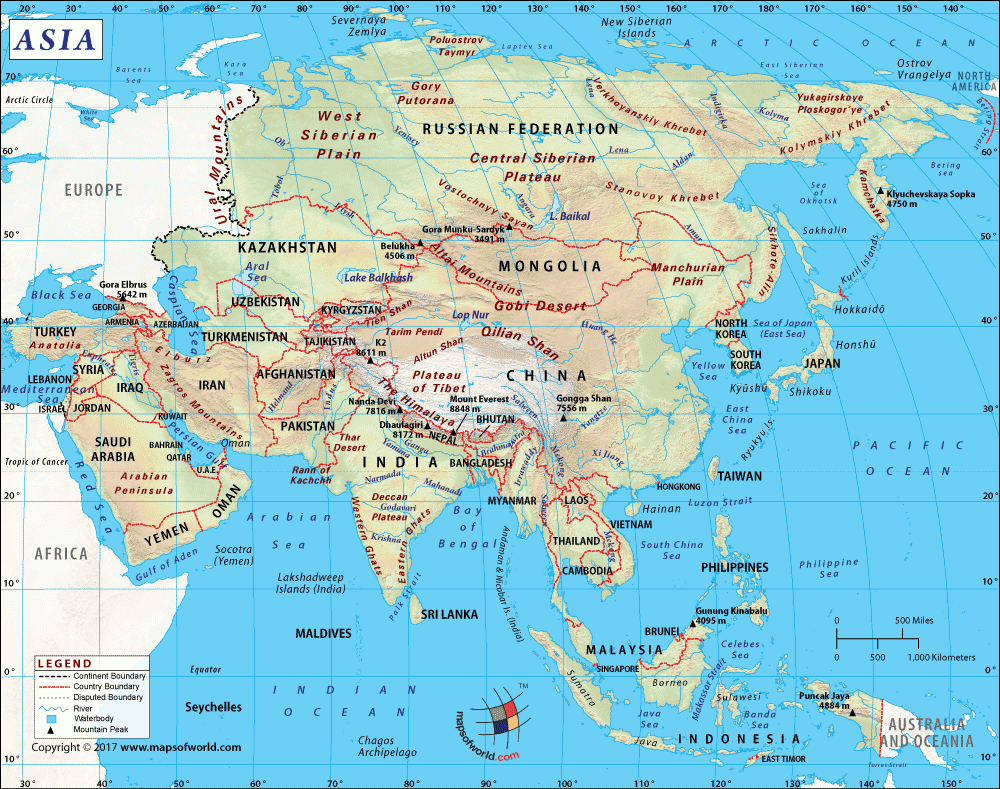What are the Key Facts of the United Arab Emirates?

|
Official Name |
United Arab Emirates |
|
Continent |
Asia |
|
Capital |
Abu Dhabi |
|
Largest City |
Dubai |
|
Coordinates |
24.000000, 54.000000 |
|
Area |
32,300 sq. mi ( 83,600 sq. km) |
|
Land Boundaries |
662 mi (1,066 km) |
|
Coastline |
819 mi ( 1,318 km) |
|
Currency |
UAE dirham (AED) |
|
Neighboring Countries |
Saudi Arabia, Oman |
|
Population |
9,599,353 (2018 est.) |
|
Official Languages |
Arabic |
|
Major Religion |
Islam |
|
National Day |
2 December (National Day) |
|
National Anthem |
“Nashid al-watani al-imarati” |
|
Form of Government |
Federal constitutional monarchy |
|
President |
Khalifa bin Zayed Al Nahyan |
|
Prime Minister |
Mohammed bin Rashid Al Maktoum |
|
GDP per capita (PPP) |
$ 74,942.7 (World Bank, 2018) |
|
GDP per capita (nominal) |
$ 43,004.9 (World Bank, 2018) |
|
HDI |
0.863 (2017), Rank: 34 |
|
Literacy Rate (%) |
NA |
|
Space Agency |
United Arab Emirates Space Agency (UAESA), Mohammed bin Rashid Space Centre (MBRSC) |
|
Military Expenditure Ranking |
NA (SIPRI, 2017) |
|
No. of Olympic Medals |
2 (as of 2018) |
|
Driving Side |
right |
|
Calling Code |
+971 |
|
Time Zone |
UTC+4 (GST) |
|
Internet TLD |
.ae |
Where is the United Arab Emirates?
The United Arab Emirates or UAE is a west Asian country that borders both the Persian Gulf and the Gulf of Oman. This country is located at the southeast end of the Arabian Peninsula of Western Asia. It borders Saudi Arabia to the south and Oman to the east.
What is the Geography of the United Arab Emirates?
UAE is spread across a total area of 83,600 sq. km (32,300 sq. mi), out of which 83,600 sq. km (32,300 sq. mi) is land area and 0 sq. km (0 sq. mi) is water area. It has a 1,066 km (662 mi) long land boundary and a 1,318 km (819 mi) long coastline.l
The terrain in the coastal belt consists of a flat, barren plain that merges into the rolling sand dunes of vast desert, and mountains in the eastern parts. The mean elevation of the country is 149 m (489 ft). While Jabal Yibir is the highest elevation point of the country at 1,527 m (5,010 ft), the lowest elevation point is the Persian Gulf at 0 m (0 ft).
The landscape of UAE consists of desert wasteland having large and rolling sand dunes. The Rub’ Al Khali Desert’s outer reaches stretch into UAE. The coastal areas in front of the Persian Gulf are flat. The northeast landscape is dominated by the Hajar Mountains. The highest elevation point, Jabal Yibir, is located in the Hajar Mountains.
Many offshore islands, as well as inlets, are present in the Persian Gulf. No significant rivers or lakes are there in UAE. Some of the major mountains in the United Arab Emirates are Jabal Bil ‘Ays, Jabal Jabsah, Jabal Qitab, Jabal Ḩafīt, Jabal Yibir, etc.
A desert climate is found in the United Arab Emirates. The climatic condition includes a very mild winter along with very hot/sunny summers. The heat becomes unbearable because of the Persian Gulf’s humidity.
The annual rainfall level is below 100 mm (4 in) throughout the country. Most of the rainfall talks place during winters. The rainfall is rare. However, they occur in the forms of downpours or showers. Sometimes, the rainfall can be intense.
There are 7 emirates in the country. While 6 of them (Dubai, Abu Dhabi, Umm al-Quwain, Sharjah, Ras al-Khaimah, and Ajman) overlook the Persian Gulf, one (Fujairah) overlooks the Gulf of Oman. Abu Dhabi is the largest emirate of the country, which also constitutes the country’s capital.
In January, the daily average temperature revolves around 19.5 °C. However, in August the average temperature revolves around 36.5 °C (98 °F).
What is the Economy of the United Arab Emirates?
The economy of the UAE is the second largest one in the Middle East. Though the economy is heavily dependent upon petroleum as well as natural gas, it has been successful in diversifying the economy successfully.
The nominal GDP of the United Arab Emirates has grown at a rate of 1.424% in 2018 to reach a figure of US$414.179 billion. The major export items of the country are gold, diamonds, crude/refined petroleum, petroleum gas, dates, dried fish, re-exports, etc. The major imports of UAE are refined petroleum, diamonds, cars, jewelry, gold, etc. In 2017, the total value of exports and imports was US$142 billion and US$175 billion respectively. This resulted in a negative balance of trade of US$34 billion.
The rate of unemployment has increased from 2.46% in 2017 to 2.57% in 2018. The country that is known for its skyscrapers, high-end shops, luxurious vehicles, and fast food chains is plagued by a high rate of poverty. Reports say that the rate of poverty (defined by 80 dirhams or $22 per day income) in the United Arab Emirates is 19.5%. Around 88% of the UAE population is expatriates from other countries such as Morocco, Egypt, and South Asia. Most of these expatriate live below the poverty line.
What is the Transportation System of the United Arab Emirates?
There is 4,080 km (2,535 mi) long roadway present in the United Arab Emirates and all of them are paved. Out of these paved roadways, 253 km (157 mi) is expressways. 43 airports are there in the country, out of which 25 have paved runways and 18 have unpaved runways. 5 heliports are also there.
The major seaports present in UAE are Mina’ Jabal ‘Ali, Al Fujayrah, and Mina’ Rashid in Dubai, Khor Fakkan in Sharjah, Mina’ Saqr in Ra’s al Khaymah, and Mubarraz Island in Abu Dhabi. Two container ports are also there and they are Dubai Port and Sharjah’s Khor Fakkan. Das Island is the LNG terminal.
616 merchant marine vessels are there in the country, out of which 103 are general cargo, 2 are container ships, 22 oil tankers, and 489 others. Some of the major airports of AUE are Abu Dhabi International Airport, Al Ain International Airport, Dubai World Central – Al Maktoum International Airport, Ras Al Khaimah International Airport, Sharjah International Airport, Dubai International Airport, etc.
What International Organizations is the United Arab Emirates part of?
WTO, UN, WHO, IMF, NAM, UNESCO, ILO, ABEDA, AFESD, AMF, BIS, CAEU, CICA, FAO, G-77, GCC, IAEA, IBRD, ICAO, ICRM, IDA, IDB, IFAD, IFC, IFRCS, IHO, IMO, IMSO, Interpol, IOC, IPU, ISO, ITSO, ITU, LAS, MIGA, OAPEC, OIC, OPCW, OPEC, PCA, UNCTAD, UNIDO, UNRWA, UNWTO, UPU, WCO, WIPO, WMO, AfDB (nonregional member), ICC (national committees), OIF (observer)


